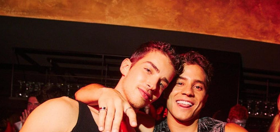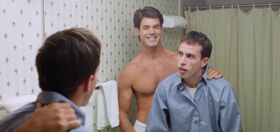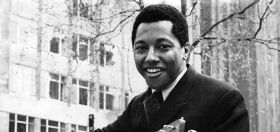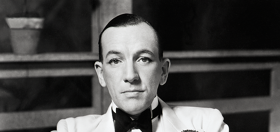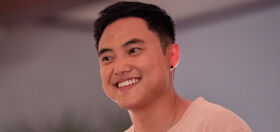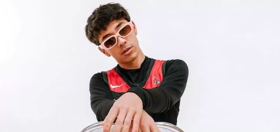
Anybody could mistake Jason Stuart and Mitch Hara for a longtime married couple.
The two have an immediate rapport, a rapid-fire banter between them that lends itself toward completing each other’s thoughts, or spontaneous bickering. No wonder, then, that the pair decided to actually play a married couple in the new digital series Smothered.
For both men, Smothered represents the culmination of years of work. Stuart has long had a reputation as a witty stand up comic, and effective character actor. His screen credits include prestige pictures such as Tangerine, The Birth of a Nation and Love is Strange. Hara has focused more on writing and directing for the stage, making the occasional on-screen appearance with roles in Skins and ER.
Smothered casts Stuart and Hara as Ralph and Randy, respectively, an aging couple suffering from relationship woes and general boredom. Each episode finds the pair encountering a new relationship therapist where their sessions immediately derail into chaos, often leading the therapist to consider a new career route.
How about we take this to the next level?
Our newsletter is like a refreshing cocktail (or mocktail) of LGBTQ+ entertainment and pop culture, served up with a side of eye-candy.
Smothered just arrived on Amazon and SmotheredTV.com. We caught up with Hara & Stuart to discuss the inception of the show, their careers, and their experiences as out gay men in showbiz.
How did the two of you get hooked up?
Jason Stuart: I don’t know if Mitch remembers this because he was so drugged out.
Mitch Hara: That’s probably true. Amphetamines.

Oh goodness.
MH: In the day.
JS: It was in the day…around 30 years ago I’m guessing. Taylor Negron had invited me to a party at Mitch’s house. I don’t remember if it was a birthday…
MH: It was because I was alive!
[Laughter]
JS: I saw this guy with this hair–
MH: I had a long Jew-fro and was always in black. Like a spider.
JS: He scared the sh*t out of me. I don’t think I ever even said hello.
MH: You had that bad toupee.
JS: I did not have a hairpiece. Not then.
MH: You came out of the womb with that hairpiece. Yeah, so we’ve known each other 30 years. We’d be friends, we’d lose contact, then we’d come together and support each other.
JS: Our lives kept crossing.
MH: We were never tight.
So at what point, then, did you decide you wanted to collaborate on the show?
MH: We had a huge fight.
JS: Very big.
Over what?
JS: Well it was more of a fight to him than it was to me.
MH: That’s such a lie. You’re horrible.
JS: I had an idea that I wanted to do a web series about people over 50.
MH: Old and horrible. Then he texted me a thousand times.
JS: It was only twice.
MH: But I figured I should give him a call to hear what he has to say.
JS: I told him I didn’t want to lose a friendship over it.
MH: I told him I didn’t care. But I said that I thought the best part of our relationship was that we could fight and it would be funny. So I thought, this is the best thing to put on parade.

JS: I said let me think about it.
MH: Yes you did.
JS: You make up everything. What really happened was that I gave him some ground rules.
MH: You said you needed top billing.
JS: Yes, I have 150 credits.
Oh dear lord…
JS: So we talked about billing and quality control.
MH: We wanted it to be great, not a vanity project.
JS: So we started working together, and it was great. And we called in this gal Terri Hanauer. That sealed the deal for me.
MH: She’s amazing.
JS: Terri evened out the show a little.
MH: She was our referee.
I like that you describe her as such. I want to ask about your writing process. Does Terri help you find the balance for your characters?
JS: We started writing improvisationally. We’d write the stuff down, Mitch would write it out, I’d rewrite it, and then we’d give it to Terri. She’d have a long list of questions and really grounded us.
MH: We would have long conversations about relationships. Because we’re so combative, we would have all these funny riffs going on. I’d write all this sh*t down and send it to him.
How much did you improvise on set?
JS: There was one thing in episode four. Mitch actually grabs me in the scene and puts his hand over my face and kisses me. Now, for an actor, you don’t want someone putting their hand over your face in a scene. He now uses that picture–
MH: Everywhere.
[Laughter]
JS: So what happened in the scene was magical, and one of the funniest moments in the piece. He grabs me and kisses me really hard. And I pull away. And then I go back to kiss him. The funny thing is that when I went back for more, it was so funny.
MH: When we’re in it, it’s a real relationship.
Regarding your characters, are Ralph and Randy just bored? Are they as awful people in your mind as they seem to me?
JS: I don’t think we think either one of those things.
MH: No. I think Randy just thinks [Randy] is amazing. I love myself. I think he thinks Ralph is holding him back.
JS: Yeah.
MH: And he keeps cheating to make himself feel young. Ralph is just so stunted in terms of what he wants.
JS: Ralph really does love being in a relationship. He truly does want to make it work, but he feels like two cents most of the time. There’s a part of him that’s very Edith Bunker-esque. That’s an old reference.
I get it.
JS: He’s the king of avoidance.
MH: What’s great about this dance of death is that we’re the perfect foil for one another. I think [Randy] is caught up in looking like Ralph, not looking at himself. I think Ralph just projects everything wrong with the situation onto Randy.

What comment are you trying to make on relationships between older, gay men? Do you see them as emblematic of something?
JS: They happen to be gay. What we’ve learned from showing people this, it seems to be in all types of relationships, straight and gay.
MH: Everyone is saying it’s universal. I’ve had straight couples tell me “This is just too close for me. I’m Randy.” It’s like I’m so sorry for both of you.
[Laughter]
JS: When Mitch proposed this idea to me, this character he wanted to do, I thought who am I in relation to that? And I did the opposite. Every great comedy team—Sonny & Cher, Jerry [Lewis] & Dean [Martin], Abbot & Costello—there’s always an aggressive one and a passive one.
MH: I always remind him that if we were Sonny & Cher, I’d be Cher. He’d be the dead one.
Oooh…wow. Too soon.
[Laughter]
JS: It’s interesting the way you’re reacting, David. We come from high comedy.
MH: There’s a very fine line between tragic and funny. We’ve learned to turn everything into material.
JS: For me, even though this was a comedy, it felt very dramatic. I was so deep into Ralph that it felt like it was happening to me. It was so deep for me. It made this a wonderfully creative experience.
MH: The drama—I would look at him sometimes in a scene, and he was fuming and drooling. He was nuts.
JS: When we saw it in a theatre, they were laughing their heads off.
MH: What I thought was melodramatic, they thought was hilarious.
That speaks to another quality about the show. There’s this unrelenting onslaught–
MH: Can we quote you?
Please. But every episode, this couple just gets worse and worse and worse. There are times it is either hysterical or chilling. I worried about these people.
JS: We didn’t want it to be just slapstick. We wanted it to have an underneath, so you really feel what’s going on with these people.
They’re driving their therapists to new careers. That’s telling. Now, I can’t think of any other shows about an older gay couple trying to save their marriage. What is the satisfaction of that? What is it about appearing in a short-form series like this that you find so satisfying?
MH: The collaborative process that we both love is that we’re not waiting for anyone to give us permission to create.
JS: That’s the best part of it.
MH: If we can generate our own project and have fun, that’s my mission in the world. To make people, happy, to make them cry, to move molecules—to me that’s the best part.

JS: My point of view is that I’ve done a lot of sitcoms written by other comedy people. I remember the most successful I was, was when I improvised around people. It started with My Wife and Kids with Damon Wayans. I played a shrink on the show. We would tape the show exactly as written, then they would say “Damon, Keisha, Jason, do whatever you want.” Every single time they would use [what we improvised]. It really taught me that my input means something. I know how I’m funny fast.
Ok…
JS: Most people want you to do comedy fast. If you can’t get what they want, they’ll get someone else. So you have to have that quality.
Why do we not see more of this niche work? This kind of personal exploration…
MH: It’s so funny. My material is that. I keep throwing that sh*t up against the wall to see who will catch it. Our literary agent was trying to come up with a prototype to describe what our series is like. And there’s nothing. That’s shocking. In this day and age, there is no series with leads being played by gay people—a couple—where they are the stars of the show. They’re all peripheral or part of ensembles.
JS: Billy Eichner had an article in Deadline [announcing that he would play Paul Lynde in a biopic]. It moved me to tears because it was so unapologetic.
MH: He was also saying things you’ve been thinking your whole life.
JS: Thank you. And he’s fighting for them. I’ve been trying to do [this show] for years, and nobody was listening. Mitch was kind enough to say “We have something together. Do this with me.”
Well, let’s discuss Mr. Eichner’s pronouncement a bit. I know the article you’re referring to. But in this conversation about casting—this is frustrating—nobody is pointing out that it’s illegal to ask an actor about his sexual history during an audition.
JS: That’s the thing. But we already know that. Let’s talk about the meaning though.
MH: Everyone knew what he meant.
JS: I don’t think so, Mitch. See, I think there’s unconscious bias.
MH: You do? What do you think, David?
I mean, look. The issue here is the employment of out, queer performers, and how being out affects their careers. Obviously, some major actors are visibly out already. I wonder if both of you might speak to your experiences: when there is the onus of being an out, gay man hanging over you in a casting room, how does that affect your job prospects?
JS: I’ll tell you the process of that. For me, I don’t think about my comedy as being about my being gay. It’s just what is, in the same way other comics talk about their lives. 10, 12 years ago, I made a conscious choice to get off the road and be a serious actor, to play parts I wanted to play. Most of the time, people laughed at me. They wouldn’t let me. They’d say “You can’t plan an annoying Jewish accountant. You can’t play a detective. We’re waiting for a hairdresser role…”
MH: Right. And I had the same experience.
JS: And I’d be happy to play that. But there is no career in those kinds of roles. Once you turn 40, 50 years old, there are no more gay parts. Very rarely.
MH: You can be the next-door neighbor behind a fence.
JS: And even then, that usually goes to someone younger and hotter. I feel incredibly lucky to be in the position I am in. I don’t take that for granted in any way. But at the same time, I also am not done. I have other parts I want to play, people I want to work with. I want to compete with straight counterparts who have series roles. I remember Mario Cantone had a deal for a series where he was going to play a straight guy. And it never went anywhere. There was never a gay person, other than Sean Hayes, who had [a series lead]. People are always afraid of being the first to pull the trigger on something.
MH: I also think it’s a matter of, over time, people make more courageous choices and get more interesting. But you’re also not Brad Pitt. You’re not Matt Bomer.

Well, that gets to the heart of this. Matt Bomer auditioned to play Superman so many times over a 10-15 year period. And he never got the role, at least not in live-action. Whether or not his sexually affected that, I don’t know. But there was always a rumor that he couldn’t get the part because he was gay. That mentality seems to have changed on television. Plenty of gay actors have all kinds of roles.
MH: And that’s true in the theatre.
Sure. But you also don’t hear anyone say Jodie Foster can’t play a straight woman. Or Sarah Paulson. Or Kristen Stewart.
MH: Right. It’s the difference between women and men.
I think that’s part of it. Someone like Zachary Quinto gets leading roles in movies…
JS: This is where the line is drawn. It’s in terms of the amount of money they make, and in terms of if it’s a studio picture or network show. That’s where the line is drawn.
And that’s not a phenomenon unique to queer performers or gay men specifically.
JS: It’s not equality. Mitch is right. We have moved up. People don’t care. But there’s a ceiling for us. When [Smothered] got on Amazon, we danced in the streets. But why wouldn’t this series be on network television? Why wouldn’t they want to do that? We are America.
MH: Well that’s like [auditioning] to play a lawyer. People would say they don’t see me as a lawyer.
JS: So play the lawyer in a different way. Give us an opportunity. Let us step up to the plate.
MH: They don’t want to let us do that.
JS: And that’s what Billy is saying. A straight guy can play a gay guy and be creative. But us—if they see a Mitch or Jason playing a part, they just laugh.
Now that being said, a lot of the gay actors I know or talk to generally do play a majority of straight characters. But they’re not big stars constantly getting photographed with a boyfriend on a beach somewhere.
MH: And in the era of social media…
Right. And let it be said too, this doesn’t seem to be as much of a problem for foreign actors. Ben Whishaw, Richard Madden, Luke Evans—they play straight characters here in America all the time. Why’s that more acceptable—seeing a foreign gay actor play a straight character rather than an American?
JS: It’s because in the Trump era, we are always obsessed with what white, Christian, heterosexual men think rather than the rest of the country.
So what’s the solution to this? I’ve talked to casting directors who admit to researching actors on social media to see if they’re gay before calling them in for an audition.
MH: I work at a studio. And I hear all the execs and casting directors talking. It’s true: they’ll say “Too weak. Too soft. Too light. He reads too gay.” Those are real conversations they have when making their lists [of potential actors]. For me, the answer is to keep creating my sh*t, what’s meaningful to me. Build it and they will come. Then they’ll invite you to be part of their things. I’ll be dead if I have to wait for them. That’s why I called Jason.
JS: And let’s do it well and have fun.
MH: Create your own vehicle.

So what’s the future of Smothered? Expanding it into a half-hour sitcom? Doing more digital seasons?
JS: What we want to do, our goal, is to have it be a half-hour series and have someone bankroll it. We produced this ourselves.
MH: It’s interesting, David. You asked why there aren’t more personal stories. I think it takes a certain amount of—people always tell me my material is brave. Or it’s bold. We don’t think of it that way. If I’m going to do anything, it’s got to have truth. My truth is in my heart and soul. That’s all I have that I can share.
How close are you?
MH: We have a lot of people interested.
JS: We have options, but nobody has said “yes” yet. Right now, I like where I’m standing.
Smothered streams on Amazon and on SmotheredTV.com.
This article includes links that may result in a small affiliate share for purchased products, which helps support independent LGBTQ+ media.







